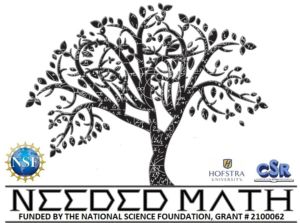
From its identification of 40 important math skills for manufacturing technicians to know, the Needed Math Project has developed a framework for instructional scenarios. The team hopes that technical educators will use the framework with their local industry advisors to create scenarios that teach math skills in the contexts of the advanced technology workplaces where their students are likely to work.
The project website (https://www.neededmath.org) also has nine sample scenarios. However, at conferences and in journal articles this year the team is directing attention to the open-ended framework.
During a lively Zoom interview for the ATE Impacts Blog, Principal Investigator Dr. Michael Hacker and the project’s four co-principal investigators shared their hope that community college educators will use the framework for conversations with industry advisors in order to inform lessons.
This emphasis on the framework is also because the team members have found during their collective decades of professional experience that educators are more likely to adjust what and how they teach if they are involved in developing the instructional materials.
Hacker put it this way in comments that referenced the work of Dr. Gerhard Salinger, co-principal of the Needed Math project and former co-lead program director of the Advanced Technological Education program at the National Science Foundation (NSF):
“Gerhard led for years the instructional materials development program at NSF, and so much good stuff came out of that. But, you know, some turned into shelf ware ... without a lot of sustained promotion, a lot of professional development work, much of this good curriculum, much of this great stuff that really is well-conceived, pedagogically brilliant, sits on shelves. It just does not get translated. And what teachers want to do is they want to develop their own stuff for their own students—that fits their own interests, in their own communities.
Hacker said that is the reason for the framework with just a few scenarios as examples. “The purpose of our showcasing them at conferences is to give people a model that they can then use to develop their own stuff.”
Survey Identifies 40 Important Math Skills for Technicians
The focus on scenarios in the second phase of the Needed Math Project is a result of a key finding from the project’s survey of industrialists, technicians, and technical and math educators. (In addition to the survey, the first phase of the project included the project team’s site visits to manufacturers.)
The Needed Math team found that novice technicians can do addition, subtraction, multiplication, division, and basic algebra on discrete classroom or lab questions, but that they struggle to know how to apply math in workplaces.
“If you're taking a math course, you know what mathematics to use because you know what chapter you're in,” Salinger said, eliciting laughs from the four other Needed Math team members before continuing. “But in an industry problem, the first question is ‘What math do I need to bring to this problem?’ ... and, it may be lots of different math that's taught in different chapters. But that's what you're faced with. And that's where a scenario is different than a textbook problem.”
In addition to Salinger and Hacker, who is co-director of the Center for STEM Research at Hofstra University, the interview for this ATE Impacts Blog article included co-principal investigators Dr. Bernard S. Gorman, SUNY Distinguished Professor Emeritus of Psychology at Nassau Community College and a professor in Hofstra University's graduate psychology program; Dr. Paul Horwitz, a senior scientist at the Concord Consortium; and Rodney Null, professor emeritus of mathematics at Rhodes State College.
Gorman, who is Needed Math’s research lead, explained the analysis of 313 completed surveys led to the project’s identification of 40 math skills that the team considers important for technicians to know to work well in science, technology, engineering and math (STEM) workplaces.
“So we do have a report on what people use, but again, we haven't put a ‘should’ or ‘must’ on it,” Gorman said. Detailed information about the survey is on the project’s website. The projects’ page in ATE Impacts 2024-2025 features a list of the Top 10 Math Skills Technicians Need to Know.
Project Encourages Teaching When to Apply Particular Skills Math
During the recent interview Horwitz likened the comments the team heard about math challenges during site visits to a middle school student saying “I could do the math, but I couldn't do the word problems.”
Horwitz said the challenge goes beyond mastering particular math terms or operations. For technicians making solutions, in an example he cited, “The hard part was understanding how to put these solutions together to make this other thing that [they] didn't really understand to begin with. There's some math involved, and it's not totally trivial math, but it's not all that hard either. What's hard is the conceptualization of which particular math operation is supposed to be done.”
Salinger said he hopes the scenarios will facilitate conversations between technical faculty and industry representatives about what should be in technical courses. “I keep saying we do not have the standing [or] whatever to change the math courses. We can try to change the technical courses,” he said, adding that if that happens then the technical course instructors can talk to the math instructors.
Null said it’s important for technical educators to weave real, problem-based math into their lessons because often students complete their required math courses long before they graduate.
“If the technical courses don't have it—usage of the math embedded in them in meaningful ways and stuff to carry and build on that learning that they initiated in the math classroom—it dies on the vine ... It's got to permeate not just one sector there. It's got to be all throughout,” Null said.

 Subscribe
Subscribe


 See More ATE Impacts
See More ATE Impacts

Comments
There are no comments yet for this entry. Please Log In to post one.